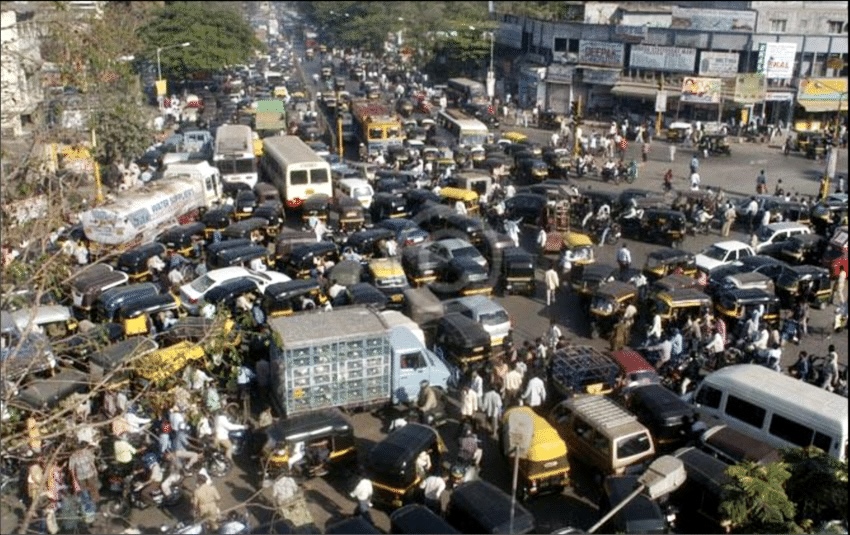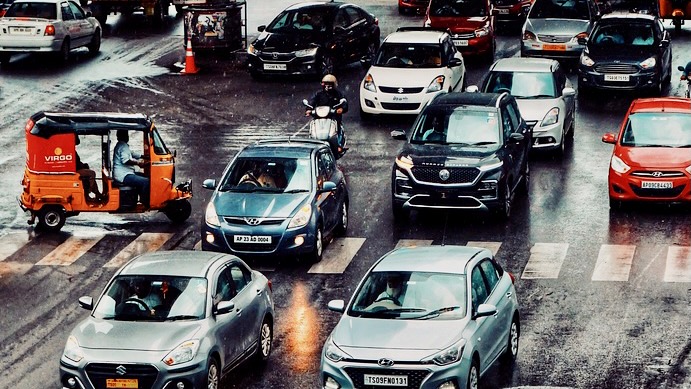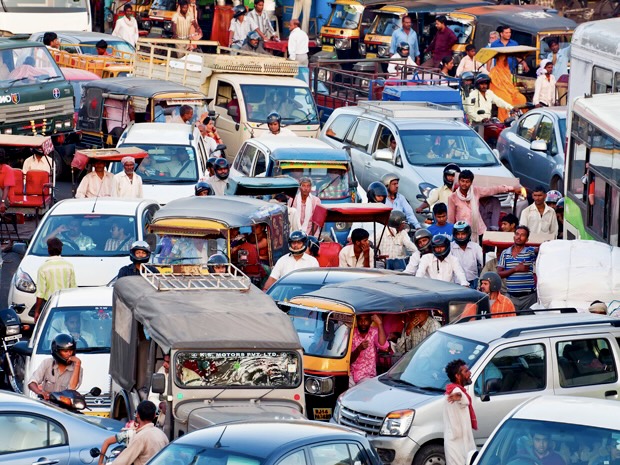When I compare the way people drive in South India with the way we drive in Europe, I am struck by what it reveals about both the Indians and us Europeans.
In South India, when you enter the daily traffic fray, whether in a car, a tuk tuk or on a motorbike, at first you are in choc. It is nothing short of chaos, anarchy, bedlam. And very noisy too as everyone hoots like mad. Then, when you start to overcome the choc, and start taking a closer look as to why all this doesn’t just end up in a huge heap, you slowly come to realise something. Behind all the apparent madness, there is an inherent pattern of behaviour, with implicit rules, which each driver intuitively follows and which prevents the much apprehended disasters.
Indians have a near complete disregard for any formal road code. Everyone had to learn it to get their driving licence. But that was just a formality to obtain the necessary piece of paper to let you loose on the road. There are practically no road signs and very few traffic lights. And where they are a few, they are often just ignored , except in big cities like Chennai or Bangalore, where the police use electronic surveillance to nab the culprits.
In the mayhem that prevails on streets and roads, everyone is constantly looking to push for advantage, to get ahead faster.
It seems everyone has this blind belief that if they just keep moving, things will take care of themselves. And if it all comes to a standstill, well one might have to reluctantly cooperate by standing still for a few seconds, or swing onto the sidewalk or what not, until the meandering traffic resumes its course, just like a powerful river. And on they go, taking over which ever way is the most opportune, sometimes even against the flow if it is shorter…. Forget the driving code. Everyone just goes with the gut.
The inherent pattern of behaviour beneath the apparent chaos reminds me of the systemic rules of a starling murmuration, that we might see in autumn in our country side. They move and sway following three basic principles :
First rule: Separation. Avoid colliding with any one else, whether bus, car, motorcycle, roaming animals, humans or what not. Even if by a hair’s breadth.
Second rule : Alignment. Keep within the general mouvement and follow the direction, and you will be fine.
Third rule : Cohesion. Always keep veering towards the centre (in this case the road), even if momentarily you had to get off it, to get ahead a bit faster.


The horn here plays a vital role for everyone. It is probably the most important piece of driving equipment for any driver. Far more important than signalling lights (rarely used) or hand signals (only used as a last resort to force passage). Each driver keeps making as much noise as possible, to signal to anyone ahead that he is coming up from behind. It is NOT used to say “get out of my way”, as it is back home. Merely to signal your presence and location for those ahead.
Everyone wants to avoid a collision but still get ahead as fast as possible. There is a vital energy in all this that is astounding. There is no courtesy between drivers, no one has time for that. Everyone just constantly pushes ahead, and pays no attention to you, let alone yield to let you through.
I also notice another phenomena, which we don’t see back home. Though reckless and hooting like mad, I observe that there is nearly ever an angry word spoken or murderous looks exchanged. When a motorcyclist is riding in the middle of an open road and you press your horn to signal your presence behind, neither my driver nor the fellow on the motorbike shows the slightest anger. Not even an annoyance. The horn is not to ask him to move closer to the curve – that would be a waste of time. You are signalling your presence and he has heard you. But he keeps chatting with his passenger, or just enjoying the view with his legs sprawled either side, enjoying the breeze. He does not bother even to look in his rear view mirror. He just continues his present course, looking straight ahead, in a completely unconcerned fashion. If there is room ahead for you to take over, well it is up to you to take that initiative. Otherwise, just wait until the right opportunity arises. Until then, hoot as much as you want but stay cool.
No acrimony or anger, that’s what is so striking here in south India. Hundred of millions of people circulate constantly. Just a reminder of the difference in scales: Tamil Nadu has 76 million people living on 130,000 square KM, versus our 67 million in the UK living on 240,000 square KM, or nearly double the size !
This throws back an uncomfortable reflection. It actually reveals just how angry many of us are or have become, particularly when we drive our cars. Driving for us is about, well, me first and foremost. It is first about a me that might be feeling insecure, maybe a bit angry deep down, or just frustrated, but more often than not just dismissive of the other.
“How dare this chap hoot me !” “Who the devil does he think he is ?” “God, where did she learn how to drive ?”
Why such a difference ? Maybe one of the reasons is the role of religion here. In rural India, many people are religious (a good 1/3rd deeply, 1/3 just-in-case, and the rest, well not really but they go along). It seem that, by and large, people are moved by a higher purpose in life than just focussing on their own selves. Many think of karma, of reincarnation, of doing a good deed to receive in return some form of positive energy. Oh sure, each has to struggle and thrive to make their way, climb up the human heap, fend off the constant competition, outwit the other at the first occasion. But notwithstanding that, many people appear to be in the service of someone or something else, which prevents them from going beyond an invisible red line, to further their interest at the detriment of those around them. There are just too many “Me’s” in India for that to really work. The majority seem resigned to compose with the Whole, simply because in the end it always prevails. And you must think of your karma…
Oh come come now, I hear you reacting, Indians can be just as mercenary and ruthless as anyone in the West. True. India has its own unbelievable examples of bare faced greed, in particular within the higher echelons of society, just as anywhere else.
But I am referring to the hundreds of millions of people below, who have less, whom, for the most part, live at the edge. They seem to be at peace with themselves, more accepting of their fate, less angry or fearful. Just dealing with reality. And without arrogance, as that can only get you into trouble.
A road accident here is often a disaster for both parties. It can result in bodily and material damages, loss of income. For the great majority of people an accident can have serious consequences.
An accident is just bad luck, very rarely done out of sheer carelessness or out of complete disregard for the other. Because if, to the people who rapidly gather around an accident, it appears one of the drivers was reckless or just brazenly arrogant, retribution could be swift and immediate ( including beating the culprit to death). The Whole rules over the Parts, in a way the Parts instinctively hold in respect.
Yes, we are very different from the Indians. but maybe not necessarily for the better…

